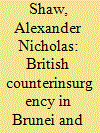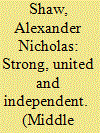| Srl | Item |
| 1 |
ID:
146231


|
|
|
|
|
| Summary/Abstract |
This paper uses recently-released material from the ‘migrated archives’ to provide an original counterinsurgency analysis of the TNKU revolt in Brunei and Sarawak from December 1962 to May 1963. It argues that, despite a failure to act upon intelligence predicting the outbreak of insurgency, Britain developed a highly effective counterinsurgency organisation. These records also indicate that decision-makers drew inspiration from the Malayan Emergency to inform success in Brunei. Although Malaya has been challenged as a counterinsurgency paradigm, the Brunei operations show the utility of striking a balance between inappropriately copying from past campaigns and developing best practices applicable to the unique environment of Borneo. In turn, the evolution of effective operational practices in Brunei informed their successful application to the subsequent Indonesian Confrontation.
|
|
|
|
|
|
|
|
|
|
|
|
|
|
|
|
| 2 |
ID:
154863


|
|
|
|
|
| Summary/Abstract |
From 1946–1963, MI5 operated a South-East Asian regional headquarters in Singapore: Security Intelligence Far East (SIFE). This article responds to growing interest in theatre-level intelligence organisation and the importance of intelligence to Britain’s Cold War and decolonisation by examining the performance of SIFE. On the organisational level, SIFE was strongest when it remained wedded to its charter functions and closely adhered to the priorities of its principal consumer: the Commissioner-General for South-East Asia. Its assessments were influential in shaping decision-makers’ understandings of key regional developments, although this did not always translate into public policy. Lastly, SIFE enjoyed success in developing lasting liaison relationships to cement British influence, but failed to utilise these to improve its intake of raw intelligence.
|
|
|
|
|
|
|
|
|
|
|
|
|
|
|
|
| 3 |
ID:
146792


|
|
|
|
|
| Summary/Abstract |
This article challenges traditional accounts of the 1946 Cold War Crisis in Iran by moving beyond Soviet–American confrontation to focus on British policy. In contrast to the United States, Britain was a major stake-holding power in Iran due to the valuable holdings of the Anglo–Iranian Oil Company (AIOC). By comparing the reactions of the AIOC and Foreign Office, continuity between the events of the 1946 Crisis and later developments in the Mosaddegh premiership becomes apparent. Soviet interference in Azerbaijan prompted great concern from representatives in Iran, but the central Foreign Office pursued a more cautious policy. Only concerns relating to the growth of domestic Iranian communism in the form of the Tudeh Party and the threat this entailed to the British concession prompted the Foreign Office and AIOC to take measures rendering them partially complicit in the internationalization of Iranian politics, setting an important precedent for future action. This article evaluates the policy-making process and its impact on Anglo–Iranian relations by utilizing records from the UK National Archives, British Petroleum Archive and diplomatic personal papers.
|
|
|
|
|
|
|
|
|
|
|
|
|
|
|
|